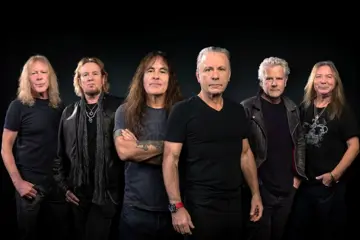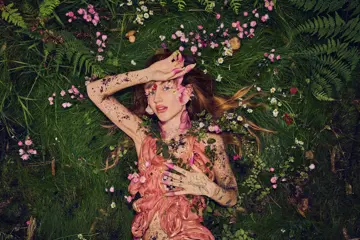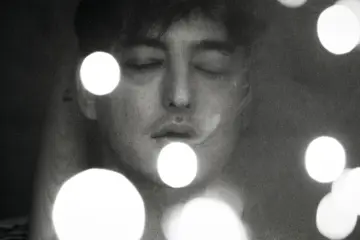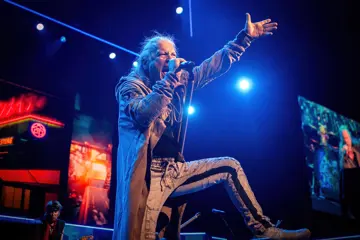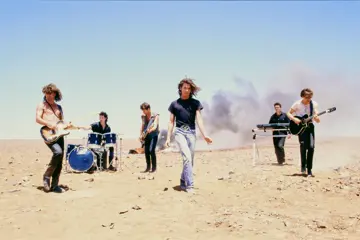Music industry legend Simon Napier-Bell is a keynote speaker at this year’s BIGSOUND. As well as managing Wham!, The Yardbirds and Marc Bolan, and co-writing Dusty Springfield’s You Don’t Have To Say You Love Me, Napier-Bell was closely connected to two Aussie pop acts.
The story of how he discovered one pop sensation is a classic.
It’s 1971. By day, John Young is working as a sheet metal worker. By night, he’s the singer in a band called Elm Tree. But the band is about to break up. John doesn’t know it, but Simon Napier-Bell is in Sydney to produce some records for the Alberts label. They’ve got a Vanda & Young demo called Pasadena and a studio is booked; they just need a singer. But the producer spends too much time partying and forgets about the recording deadline.
As the session looms, he’s on a desperate search for a singer when he stumbles across Young at the Liverpool Masonic Hall in Sydney. Elm Tree are supporting an Australian band called Velvet Underground, featuring Malcolm Young on guitar and Herm Kovac on drums. (Young would, of course, find fame in AC/DC, while Kovac would co-found the Ted Mulry Gang.)
Napier-Bell asks the Velvet Underground singer, Andy Imiah, if he’d be up for making a record. He says no – “I’ve just joined this band and I don’t want to leave them in the lurch.”
“Why don’t you try Mungy over there?” Kovac suggests. “He might do it.”
Don't miss a beat with our FREE daily newsletter
Mungy was Young’s nickname, “and like most good nicknames, the ones you’re not fond of stick”. Chomping on a big cigar, Napier-Bell approaches Mungy. “Would you like to make a record?” he asks.
Napier-Bell is yet to hear him sing a note, but soon after, Young – dressed in his blue boilersuit – is on the train to the city for a meeting at the Alberts office in King Street. “A new world opened up for me,” he recalls. “I had seen such sophistication in movies but for me to walk into Ted Albert’s office was an amazing feeling.”
John Young – who would later become John Paul Young – had a record deal.
“I had no idea about Simon and his extensive CV,” he later reflected. “And I’m quite sure that in my case the old saying that ignorance is bliss certainly helped me because had I known more about Simon, I would have been shitting myself even more than I already was.”
Within days, JPY was flying to Melbourne – his first time on a plane – to record Pasadena at Armstrong Studios, with Simon Napier-Bell in the producer’s chair.
His instructions were simple: just sing over the top of the Vanda & Young demo. “As I was delivering the vocal, I completely ran out of breath and, consequently, the final chorus of Pasadena is sung by George Young [no relation] without the addition of my voice,” JPY revealed in his 2019 autobiography. “It still amuses me that my first release was a de facto duet and that the other vocalist, one of my heroes, had no idea about what was transpiring.”
Pasadena – which Vanda & Young wrote with English actor David Hemmings – hit number 16 on the national charts, the first of a dozen Top 40 hits for JPY, in a career that also included Top 10 hits in the US, UK, South Africa, Germany, Sweden, the Netherlands and Norway.
Napier-Bell co-wrote the B-side, turning another Vanda & Young demo into a song called Better Go Back To Bed.
Fifteen years after discovering John Paul Young, Simon Napier-Bell was instrumental in the career of another Australian pop act.
In 1986, Napier-Bell got a phone call from Denis Handlin, the then boss of CBS in Australia. “I’ve got a band you ought to manage,” Handlin told him. “They’re bloody marvellous. They’re called Wa Wa Nee.”
A few days later, Napier-Bell was on a plane, on his way to the CBS conference on the Gold Coast. “Having travelled for 30 hours, I staggered into the conference hall at 6pm, to hear Denis introduce me as a ‘music business legend’,” Napier-Bell writes in his new memoir, Sour Mouth, Sweet Bottom.
Handlin pledged to the CBS staff: “If Simon Napier-Bell can’t make Wa Wa Nee number one in the USA, I, Denis Handlin, promise to eat a dead rat in front of you all at next year’s conference.”
The next day, Wa Wa Nee played at a small club. “They sounded at least as good as their recordings and looked sharp and not at all American, which was a good thing since it meant I could promote them in the States as something totally fresh,” Napier-Bell recalls.
The manager told Handlin he wanted “lots and lots of thousands of pounds to make top-class videos of two of their songs and to fly them to Europe and America”. Handlin agreed. Napier-Bell loved Wa Wa Nee, “a four-piece band who wrote their own songs, had an eye-catching singer and three excellent musicians to back him”.
He blew the budget on the Sugar Free video, “but never mind – the song would be a hit in America and more funds would then become available”.
When Napier-Bell and the band landed in the US, their debut single, Stimulation, had already been a hit on the Billboard Hot 100 (#86), after peaking at #2 in Australia (kept out of top spot by Samantha Fox’s Touch Me).
Wa Wa Nee singer Paul Gray remembered how the band polarised Australian music fans. On Countdown, Molly Meldrum ripped up the pages of RAM to protest a scathing review of the group’s debut album. “That’s passion,” Gray laughed. “RAM were probably right in many respects, but Molly wasn’t having any of it. The next issue of RAM, we got even worse treatment. Fans were siding with Molly or against. Boy, the kids took their pop seriously back then!”
On Countdown, Molly talked about how Wa Wa Nee had been dubbed “the Australian Wham!”. “And I thought that was very unfair,” he said.
“An excellent debut album by this group,” Molly added, “and I’ve got no doubt they are going to be big in America.”
In the US, CBS’s Epic Records believed that Sugar Free could go all the way. The plan was to hit the Top 40, then take the song into the Top 20 the following week, then Top 10. “If things looked good the week after that, they’d go for a number one,” Napier-Bell recalls.
Wa Wa Nee appeared on all the big media outlets, including Dick Clark’s American Bandstand.
After “exceptional” shows in New York and LA, Paul Gray was scheduled to have dinner with the head of Epic Records and his wife. “She’s taken rather a fancy to you,” Napier-Bell informed his client.
The singer didn’t like the inference. “I’m not a piece of meat,” he snapped. “I’m an artist.”
“And it’s your artistry she’s taken a shine to,” Napier-Bell tried to explain. “She loves to support new artists and she’s a big influence on her husband. Make the dinner a success and Wa Wa Nee will be number one the week after next.”
But Paul Gray refused to go, saying: “It’s not in my contract that I have to eat with executives’ wives.”
Sugar Free stalled at #35 in the US.
“Paul was a charming fellow,” Napier-Bell concludes. “And Wa Wa Nee could have been a huge act. He wrote excellent songs and sang them brilliantly. But his life was about music, not PR, and he couldn’t bring the two together. He thought artistry alone could win, so he refused to go to the dinner. For me and the rest of the band, and for Paul too really, it was just something that had to be lived with. Sometimes that’s how things work out.”
What might have been. As Ian McFarlane, the author of The Encyclopedia Of Australian Rock And Pop, said: “Before Savage Garden there was Wa Wa Nee.”
Despite his pledge, a dead rat was not on the menu for Denis Handlin at the next CBS conference. But he did give Wa Wa Nee every opportunity to conquer the world. They broke up soon after releasing their second album, Blush, in 1989. And sadly, Paul Gray died of multiple myeloma in 2018. He was 54.
Inspired by Bongo Starkie’s Skyhooks show, guitarist Steve Williams recently launched Steve Williams Plays Wa Wa Nee, celebrating the band’s hits with singer Tim Watson from Taxiride. “I was always hesitant,” Steve says. “I felt I shouldn’t do this without Paul. But we’re not pretending to be Wa Wa Nee. We’re revisiting the material in a slightly more contemporary way, and it’s great to play the songs again.”
Napier-Bell also had a stint managing another artist who died too soon, Sinéad O’Connor.
“The sad truth is that nearly every worthwhile artist suffered a traumatic childhood,” he writes in Sour Mouth, Sweet Bottom, “and Sinéad O’Connor was no exception.”
He called the singer – who died in July, aged 56 – “blunt, uncensored, unstoppable, passionate, cool, manic, honest, deceptive, solid as a rock and completely unstable”.
“She’s the only artist I ever managed who gave me a Christmas present and the only one where my management ended in a legal dispute.”
Simon Napier-Bell will appear at BIGSOUND 2023 on Thursday September 7.





